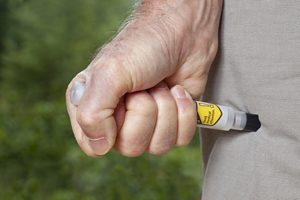
Here at Allergy Be Gone, we work hard to ensure that our customers have the information, and the products, that they need in order to be safe and healthy. Recently on the blog, we started to talk about allergies at every age, and how growing up can change our symptoms. In some cases, it can even alter our triggers, which means that we always need to be on our toes to combat our allergens.
As we reach adulthood, people who have had food allergies for most of their lives may think that they have everything under control. They know what they have to avoid, they know what medicines work and which ones don't, and they know the importance of their epinephrine autoinjector. All of these things are good, but even as an adult, your triggers can change, and what once negated your symptoms may not make a dent anymore.
Additionally, there is a chance that if you have never had food allergies before, you can develop them in adulthood. If this is the case for you, it is important to know how best to handle these new ailments.
Here are a few things to know about food allergies in adulthood:
Adulthood: If you didn't develop allergies as a kid, there is still a chance that you can as an adult. According to most industry professionals, allergies tend to crop up between 25 and 40 years of age, and then again between 45 and 55. If you experience late onset allergies, it is a good idea to invest in the appropriate over-the-counter care. If you start to notice allergy symptoms when eating certain foods, it is also a good idea to consult with an allergy specialist about a treatment plan.
Older adults: "Treatment with epinephrine is a specific concern for older adults with food allergy and anaphylaxis for two main reasons," a post for UCLA Health states. "People in this age group are more likely to experience serious cardiac side effects from epinephrine. Additionally, many people in this age group require systemic therapy with "beta blockers" for cardiac disease and/or topical therapy for glaucoma. Beta blockers, even when applied topically to the eye, can reduce the benefit of epinephrine for acute anaphylaxis."
For this age group, it is especially important that people consult with a medical professional to get the best possible care and plan for their needs.
No matter how old you are, there are a few things that you should be doing if you suffer from food allergies. First and foremost, you should always carry your epinephrine autoinjector with you. Secondly, the people that are around you most often should know about your allergies and where your EpiPen is located so they can help you if necessary. Lastly, you should get medical help as soon as you begin to notice any sort of reaction.
To learn more about the best practices for allergy prevention, be sure to stay tuned to the blog. For more information on how Allergy Be Gone can help you, visit us online today!









